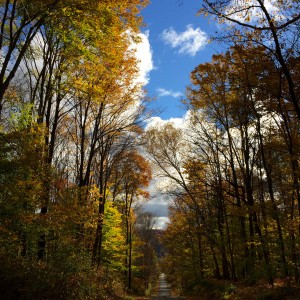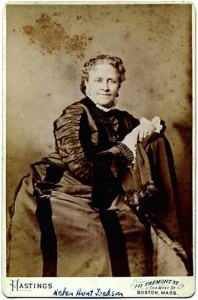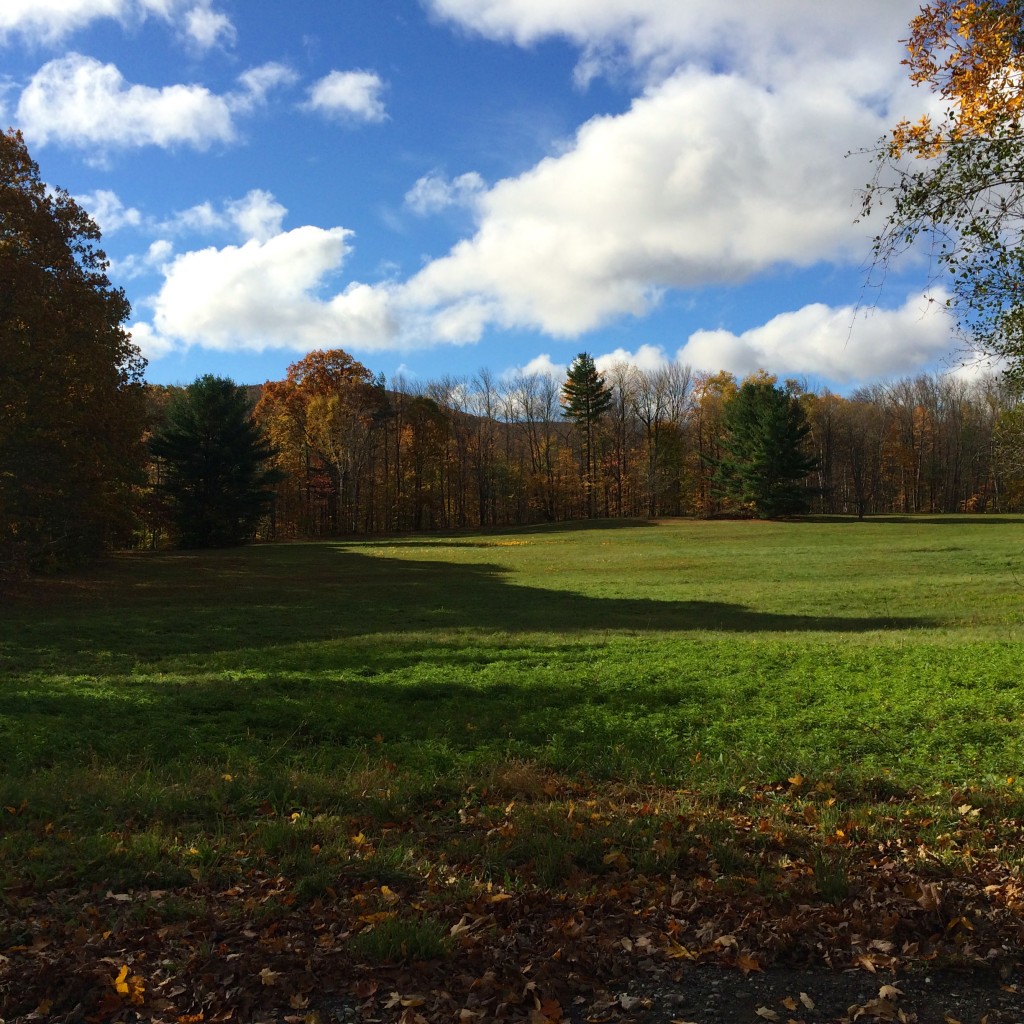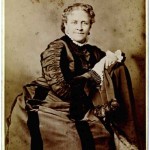 O suns and skies and clouds of June,
And flowers of June together,
Ye cannot rival for one hour
October’s bright blue weather…
O suns and skies and clouds of June,
And flowers of June together,
Ye cannot rival for one hour
October’s bright blue weather…
It’s the kind of brisk, newly pressed autumn day my mother would have chosen to recite the above lines. They’re from one of a dozen or so poems she knew by heart, along with Longfellow’s ‘The Children’s Hour’ and ‘Paul Revere’s Ride’ — verses that she had learned at the knee of her charismatic raconteur of a father. I always assumed that Longfellow had also penned ‘October’s Bright Blue Weather’ until a recent search for the poem revealed its author to be Longfellow contemporary and Emily Dickinson confidante Helen Hunt Jackson.
 Born in Amherst in 1830, Helen Hunt Jackson went to school with Emily Dickinson and they remained life-long friends. Jackson went on to publish reams of poetry, children’s books, and novels, but she’s probably best known for two books that helped galvanize America’s awareness of the plight of Native Americans. A Century of Dishonor was a scathing indictment of state and federal policies — including the many broken treaties — that helped decimate Native American tribes across the country. She then turned to fiction to bolster her case, writing Ramona, the story of a mixed race orphan girl in Southern California, that became immensely popular at the time and has been reissued over 300 times since. Almost a century after it was published, it was read aloud to me and a classroom of enraptured school girls at story hour. It’s probably not great literature and, like her poetry, is often forced and overly schematic. Even her friend Emily Dickinson had to admit that Jackson “has the facts but not the phosphorescence.” Despite that, both Ramona and ‘October’s Bright Blue Weather’ are still remembered and — because they’re works I first heard as a child —remain dear to my heart. Here’s the poem in full:
Born in Amherst in 1830, Helen Hunt Jackson went to school with Emily Dickinson and they remained life-long friends. Jackson went on to publish reams of poetry, children’s books, and novels, but she’s probably best known for two books that helped galvanize America’s awareness of the plight of Native Americans. A Century of Dishonor was a scathing indictment of state and federal policies — including the many broken treaties — that helped decimate Native American tribes across the country. She then turned to fiction to bolster her case, writing Ramona, the story of a mixed race orphan girl in Southern California, that became immensely popular at the time and has been reissued over 300 times since. Almost a century after it was published, it was read aloud to me and a classroom of enraptured school girls at story hour. It’s probably not great literature and, like her poetry, is often forced and overly schematic. Even her friend Emily Dickinson had to admit that Jackson “has the facts but not the phosphorescence.” Despite that, both Ramona and ‘October’s Bright Blue Weather’ are still remembered and — because they’re works I first heard as a child —remain dear to my heart. Here’s the poem in full:
 O suns and skies and clouds of June,
And flowers of June together,
Ye cannot rival for one hour
October’s bright blue weather;
When loud the bumblebee makes haste,
Belated, thriftless vagrant,
And goldenrod is dying fast,
And lanes with grapes are fragrant;
When gentians roll their fingers tight
To save them for the morning,
And chestnuts fall from satin burrs
Without a sound of warning;
When on the ground red apples lie
In piles like jewels shining,
And redder still on old stone walls
Are leaves of woodbine twining;
When all the lovely wayside things
Their white-winged seeds are sowing,
And in the fields still green and fair,
Late aftermaths are growing;
When springs run low, and on the brooks,
In idle golden freighting,
Bright leaves sink noiseless in the hush
Of woods, for winter waiting;
When comrades seek sweet country haunts,
By twos and twos together,
And count like misers, hour by hour,
October’s bright blue weather.
O sun and skies and flowers of June,
Count all your boasts together,
Love loveth best of all the year
October’s bright blue weather.
O suns and skies and clouds of June,
And flowers of June together,
Ye cannot rival for one hour
October’s bright blue weather;
When loud the bumblebee makes haste,
Belated, thriftless vagrant,
And goldenrod is dying fast,
And lanes with grapes are fragrant;
When gentians roll their fingers tight
To save them for the morning,
And chestnuts fall from satin burrs
Without a sound of warning;
When on the ground red apples lie
In piles like jewels shining,
And redder still on old stone walls
Are leaves of woodbine twining;
When all the lovely wayside things
Their white-winged seeds are sowing,
And in the fields still green and fair,
Late aftermaths are growing;
When springs run low, and on the brooks,
In idle golden freighting,
Bright leaves sink noiseless in the hush
Of woods, for winter waiting;
When comrades seek sweet country haunts,
By twos and twos together,
And count like misers, hour by hour,
October’s bright blue weather.
O sun and skies and flowers of June,
Count all your boasts together,
Love loveth best of all the year
October’s bright blue weather.








What a wonderful post! I knew nothing about Helen Hunt Jackson. I love the idea of your mother inheriting the poem from her father and reciting it to you every October.
And the line about “the facts but not the phosphorescence” is so inspiring, as are your extraordinary posts. Please keep them up!
Thanks, Ellen. The Dickinson line has become an instant favorite of mine!
Good old Helen Hunt Jackson!
Beautiful photos, Liza.
Of course you’d know Helen Hunt Jackson! Are they still reading her at story hour?
I’d never heard of Helen Hunt Jackson! Thank you Liza! And thank you for the wonderful poem and gorgeous photos!!
Thanks so much, Mary. I’m looking forward to seeing you soon!
Thank you Liza, as always. I depend on your marvelous blog, and this charming entry takes the edge off what I will always view as the sad season. Of course, you also provide an edge — with Dickinson’s 6-word review. Ouch.
Thanks, Bucky. Ouch, indeed! Old Emily didn’t pull any punches which is one of the many things I admire about her.
What a precious memory. Could she recite the whole poem? I don’t remember how far she could take it. So nice to see the whole magnificent poem — along with this perfectly time essay. Not all that much of October left to us.
She had quite an amazing memory. Once she got going, she could generally rattle off the whole thing, though I think she dropped the “Ye” that starts the 3rd line which is actually an improvement.
just came home from a wonderful October weekend: a walk on the tightly packed sand at the ocean at low tide to a stroll past the red, red vines wrapped around the trees leading to the bay; and a ride back home past a field of pumpkins stacked as high as possible without toppling over…some of the pleasures of Autumn!
Thanks, Liza, your memories help me create my memories.
Thanks so much for this lovely report from the beach, Annette. What a beautiful fall it’s been everywhere!
Fun to be reminded of that poem, and of your mother! October is truly a beautiful month, and this one has been as good as they get.
Thanks so much for writing, Dirk. So nice to have you remember my mother.
I wasn’t familiar with this poem and just love it. My Mother’s birthday was in October, and I now I wonder if she ever heard/read it. She would have loved it – but I have a grandaughter and two sisters-in-law with October birthdays, and I think I’ll include it in their cards!
What a lovely idea to include the poem in your birthday cards!